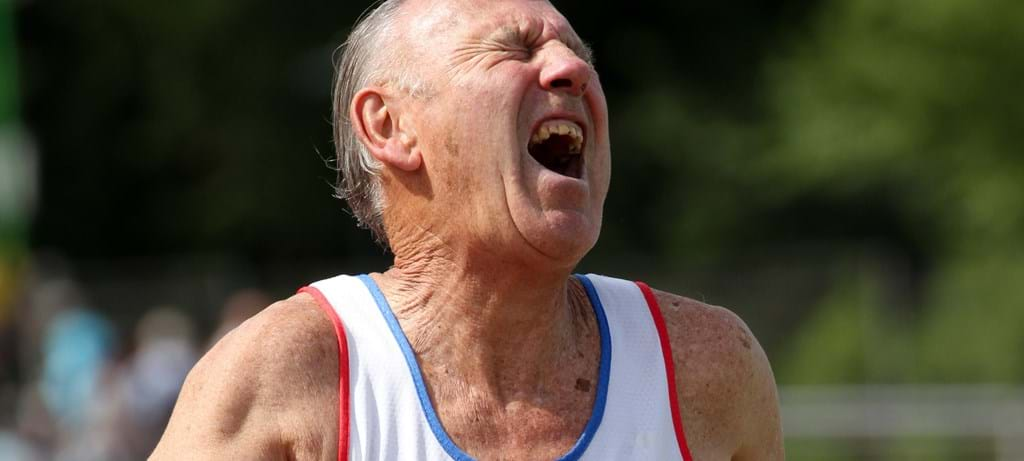
Why on earth would you run till it hurts?
Our wonderful RunTogether Ambassador, who took up running aged 65, shares her experience...
A friend of mine, who is not the least bit sporty or athletic, and who certainly doesn’t run, recently told me how she felt when she watched the finish of any race, whether at her local track or on TV.
“All the runners crossing the finishing line,” she said, “look as though they’re in agony. Every time I see it happen, I think, why would anyone want to do this to themselves?”
Interesting question, I thought. Why do we – because I too know that feeling of being ‘in agony’ at the end of a race, or just at the end of a tough run.
Should you run till it hurts?
I’m not talking here about the more everyday slog of pushing yourself on a longish run at a pace where you could carry on a conversation, even if not in full sentences. I’m talking about those occasions where you go all out, whether it’s a personal best you’re after or crossing the line ahead of anyone else, or just getting in front of your buddy who’s on your tail. Any run that’s worth its salt is a little bit uncomfortable. But what makes us go for those runs when you find yourself really struggling to stand up straight once you finished?

Before I felt I could call myself a runner, I used to think that runners were somehow different from the rest of us...
When they ran, it was effortless. Whereas when I ran, it was torture. Now that I do finally call myself a runner, I know that it’s tough for every one of us. We’re all out there, busting a gut. We all push ourselves as much as we can, whatever the speed or the distance it is that we run. And this really does include me, running at my relative snail’s pace and not very far either, and all you sprinters and marathon runners too.
I’ve learned that running takes place just as much, if not more, in our heads than our bodies. And that one of the perverse satisfactions of becoming a runner is the pleasure we gain from pushing ourselves beyond the point where our body is saying, um, you know what? Can we please stop now? And where our brain then steps in and says, nope. Just going to see if we can push on a little bit more, baby.
As I wrote those words about that painful finish, I realised that those in fact are the best moments. How counter-intuitive is that? In fact, it’s when you push yourself the most that it feels the best afterwards. It’s hard to explain that running tip to a non-runner.
So I put out a tweet on Twitter and asked for some fellow-runners to help me out here. Why do we put ourselves through this pain? Here’s what I got back:
“To find out if our limits are really where we think they are, or if they’re further.”
“Because we’re lucky enough to be able to.”
“For sense of triumph over challenge, mind over matter, best self over easy/easier way.”
“To make other hard things more bearable.”
“Once you have done something you didn’t think/weren’t sure you could do, you change a little. Then hooked, keep chasing.”
“For feel of agency, that “I CAN do this, I CAN overcome.”
“Transfers to many areas of life (battling with illness, dealing with job/family issues, following dreams).”
“Because when really hard and you keep pushing yourself, refuse to give up, and achieve – it’s revelatory…”
“Because I can. When I was ill/recovering I couldn’t. So being active reminds me how I used to feel and how far I’ve come.”
Wonderful, don’t you agree? I’m sure all of us who run will be able to relate to some, if not all of these. As an older runner, I like to remind myself at the worst moments, the moments when I want to walk and not run up that hill, or to slow down when I’ve told myself to make a burst, just how especially lucky I am to be able to run at all. I’m not ill nor am I disabled at this moment in time. And a running tip I use is I like to think I’m doing it for all the others who can’t. With them in mind, at least. That I’m celebrating the sweetness of good health in the awareness of how precious and fragile it is and how transient it may well turn out to be.
Then recently I read an article an American friend sent me. It gave me yet another reason to push myself hard when I run. Called “How To Become A Superager,”* it’s written by Lisa Feldman Barrett, a professor of psychology at Northeastern University, and published in the New York Times in December 2016.
Lisa Feldman Barrett, it turns out, has recently been engaged in a study of Superagers, a group of people aged 65 and over whose brains (in terms of their “memory and attention”) were “on a par with active and healthy 25 year olds.” Were there any common denominators of this group?
It turns out there were. And no, it wasn’t running. Some were sporty, some were anything but. However, the main factor they all had in common was that they pushed themselves to the point where it was a challenge. It didn’t matter what activity they were engaged in; they went beyond the level where it was very tempting to give up. “Hard work makes you feel bad in the moment,” she writes. What her group of Superagers excel at, she observes, is “pushing past the temporary unpleasantness of intense effort.”
So, it doesn’t matter whether you’re working out at physical activity or mental endeavour. A leisurely walk-and-jog on the treadmill with a magazine spread out in front of you isn’t going to crack it any more than doing a few Sudokus a week is. Whatever it is, her advice is “do it till it hurts, and then a bit more”. This running tip is great for motivation when you feel like giving up.
So now I have yet another reason for enjoying that painful push to the finish when I run. It’s showing me I can do more than I think I can. My limits are there to be expanded and ever-reimagined, that I am beyond-lucky to have a body that even allows me to test it in this way. And yes, it’s showing me too that it might even be making me a Superager. Now that’s what I call a win-win outcome.
For more running support, visit our tips and advice page with help available to runners of all levels.
*Source: New York Times article 'How to Become a Superager'
Image: British masters athlete Tony Bowman, born 1935, shows the pain crossing the finishing line in the men’s relay, 75-79 year age group, at the European Veterans Athletics Championships, Zittau, Germany, in August 2012.